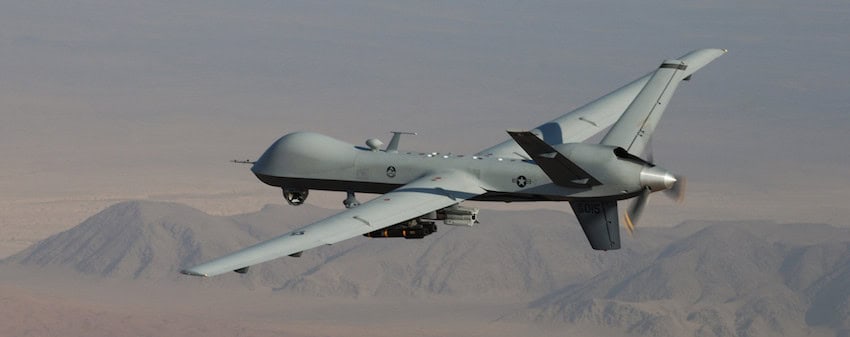 MQ-9 Reaper. Photograph: USAF.
MQ-9 Reaper. Photograph: USAF.
The US killed three al Qaeda in the Arabian Peninsula (AQAP) fighters in a drone strike last night in the southern Yemeni province of Shabwa. The strike is the third in the province this year.
The remotely piloted Predators or the more deadly Reapers fired missiles at a vehicle as it traveled in Al Houta in the Azzan district in Shabwa, Al Arabiya reported. Three suspected AQAP fighters were killed in the attack, and the vehicle appear to cook off explosives long after it was struck, according to a local Yemeni news outlet.
The identities of those killed in the US counterterrorism operation have not be disclosed. AQAP has not released an official statement announcing the death of senior leaders or operatives.
Shabwa is a known haven for AQAP and its leadership cadre. The jihadist group openly controlled the province between May 2011 and the summer of 2012, when Yemeni security forces launched an offensive to retake control of it. But AQAP has re-established its presence in Shabwa as the Yemeni government has been weakened by the Houthi rebellion in the north and west. The Shiite Houthis, who are backed by Iran, have taken control of the capital of Sana’a and much of northern and western Yemen, and they have encroached on the central portion of the country.
AQAP now operates openly in Shabwa after the collapse of Yemen’s central government. Earlier this month, the jihadist group overran the Yemeni Army’s 19th Infantry Brigade Base, which is located in the Bihan region of Shabwa province.
The US has launched four drone strike in Yemen since the beginning of 2015. The last three strikes have occurred in Shabwa, and one of those strikes killed Harith bin Ghazi al Nadhari, a senior AQAP ideologue.
The US lost its biggest partner in Yemen when the Houthis took control of Sana’a and forced President Abd Rabbo Mansour Hadi and the government to resign. Hadi was a staunch supporter of US counterterrorism efforts, including drone strikes against AQAP, despite local and international criticism. Just today, Hadi fled his presidential compound for the southern city of Aden.
Despite Hadi’s resignation, the deteriorating Yemeni security forces, and the Houthi takeover of large areas of Yemen, US officials have insisted that counterterrorism operations against AQAP will continue.
President Obama previously praised the US counterterrorism strategy in Yemen as “one that we have successfully pursued.” Despite launching 110 drone and conventional airstrikes against AQAP’s leadership, the core of the group, including its leader, Nasir al Wuhayshi, who doubles al Qaeda’s general manager, remain alive. And AQAP was able to plot and execute the deadly attack on the office of French satirical magazine Charlie Hebdo in Paris, France.








8 Comments
another ‘Flea Bite’ by the ‘Fumblelina’s’ in the US Intel Community
I used to say they did more harmful than good, now I say, better them than the resistance.
what “resistance?”
At least the drone program is still active, making at least some of those who would inherit leadership positions in [al Qaeda/ISIS/ISIL/IS . . .] think twice about sticking around.
In other words, “strategic patience” (aka, doing nothing) has its obvious limits in time and scope.
He means the mythical ‘axis of resistance’ that is comprised of Iran and it’s proxies.
r u sure?
Killing these rats with drones sounds good, but it may actually be hurting the effort. There is no Humint being obtained from these fighters to prevent future attacks and keep them off balance.
Yes.